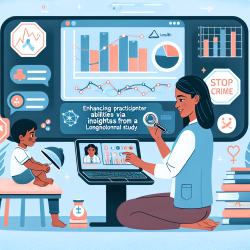As a speech-language pathologist committed to creating great outcomes for children, leveraging research to inform your practice is crucial. One particularly influential piece of research is the study conducted by Aubrey Lewis and Edward Mapother at the Maudsley Hospital, which has far-reaching implications for improving therapeutic interventions. This blog will explore how the insights from this research can be applied to enhance your online therapy services through TinyEYE.
Understanding the Research
The study by Aubrey Lewis and Edward Mapother delves into the psychiatric and psychological treatments at the Maudsley Hospital. Their pioneering work laid the groundwork for modern psychiatric practices, emphasizing the importance of evidence-based approaches and multidisciplinary collaboration. Here are some key takeaways:
- Evidence-Based Practice: Lewis and Mapother’s research highlights the importance of using data-driven methods to assess and treat patients.
- Multidisciplinary Approach: Collaboration between various healthcare professionals can lead to more comprehensive and effective treatment plans.
- Continuous Improvement: Regularly updating practices based on the latest research ensures that therapeutic interventions remain effective and relevant.
Implementing These Insights in Your Online Therapy Practice
Integrating the principles from Lewis and Mapother’s research into your online therapy services can significantly enhance the outcomes for the children you work with. Here’s how:
1. Embrace Evidence-Based Practices
One of the core messages from the research is the importance of evidence-based practice. Utilize data and research to inform your therapy sessions. Here are some steps to get started:
- Regularly review the latest research in speech-language pathology.
- Implement standardized assessment tools to measure progress.
- Use data analytics to track the effectiveness of different interventions.
2. Foster Multidisciplinary Collaboration
Working with other healthcare professionals can provide a more holistic approach to treatment. Consider the following strategies:
- Collaborate with psychologists, occupational therapists, and educators to develop comprehensive treatment plans.
- Participate in multidisciplinary team meetings to discuss cases and share insights.
- Utilize telehealth platforms to facilitate easy communication between different professionals involved in a child's care.
3. Commit to Continuous Improvement
Stay committed to professional development and continuous improvement. Here’s how:
- Attend workshops, webinars, and conferences to stay updated on the latest research and techniques.
- Seek feedback from peers and supervisors to identify areas for improvement.
- Regularly update your therapy practices based on new research findings.
Encouraging Further Research
While implementing the insights from Lewis and Mapother’s research can significantly enhance your practice, it’s also essential to contribute to the field by conducting your own research. Here are some tips to get started:
- Identify gaps in the current research that are relevant to your practice.
- Design and conduct small-scale studies to explore these gaps.
- Share your findings with the broader community through publications and presentations.
By actively engaging in research, you not only improve your practice but also contribute to the advancement of the field of speech-language pathology.
To read the original research paper, please follow this link: Aubrey Lewis, Edward Mapother and the Maudsley.










